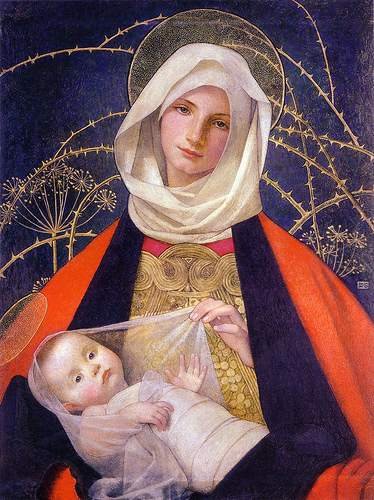
Madonna and Child, by Marianne Stokes (1855-1927). This painting was on the cover of Magnificat last December and I like it a lot.
The Church designates each Saturday in Ordinary Time, when there is no other obligatory memorial, as a memorial to the Blessed Virgin Mary. (Celebrations on the liturgical calendar have three ranks: solemnities, feasts, and memorials; memorials being the least important of the three. See the General Norms for the Liturgical Year and the Calendar III. For more on the dedication of Saturdays to Mary, see the Directory on Popular Piety and the Liturgy §188.) So, I’ve been thinking I would begin quoting some of the Church Fathers’ testimonies to the very early devotion to Mary. As historical and as important as these are, many of them are also poignant, moving, and very beautiful. From the earliest days of the Church, the Mother of Our Lord has been beloved and honored.
I’m working on a Bible study that I think will knock some socks off; that won’t be ready for another day or two. I also wanted to ask you all to pray for the peace and comfort of a dear, dear friend of mine who lost her father very suddenly yesterday, and for the repose of his soul.
Here is a reading from St. Athanasius of Alexandria (c. 297–373):
O noble Virgin, truly you are greater than any other greatness. For who is your equal in greatness, O dwelling place of God the Word? To whom among all creatures shall I compare you, O Virgin? You are greater than them all. O [Ark of the New] Covenant, clothed with purity instead of gold! You are the Ark in which is found the golden vessel containing the true manna, that is, the flesh in which divinity resides. Should I compare you to the fertile earth and its fruits? You surpass them, for it is written: “The earth is my footstool” (Isaiah 66:1). But you carry within you the feet, the head, and the entire body of the perfect God.
If I say that heaven is exalted, yet it does not equal you, for it is written: “Heaven is my throne” (ibid.), while you are God’s place of repose. If I say that the angels and archangels are great — but you are greater than them all, for the angels and archangels serve with trembling the One who dwells in your womb, and they dare not speak in his presence, while you speak to him freely.
If we say that the cherubim are great, you are greater than they, for the cherubim carry the throne of God (cf. Psalm 80:1, 99:1), while you hold God in your hands. If we say that the seraphim are great, you are greater than them all, for the seraphim cover their faces with their wings (cf. Isaiah 6:2), unable to look upon the perfect glory, while you not only gaze upon his face but caress it and offer your breasts to his holy mouth . . .
As for Eve, she is the mother of the dead, “for as in Adam all die, even so in Christ shall all be made alive” (1 Corinthians 15:22). Eve took [fruit] from the tree and made her husband eat of it along with her. And so they ate of that tree of which God had told them: “The day you eat of it, you shall die” (Genesis 2:17). Eve took [fruit] from it, ate some of it, and gave some to her husband [that he might eat] with her. He ate of it, and he died.
In you, instead, O wise Virgin, dwells the Son of God: he, that is, who is the tree of life. Truly he has given us his body, and we have eaten of it. That is how life came to all, and all have come to life by the mercy of God, your beloved Son. That is why your spirit is full of joy in God your Savior!
—St. Athanasius
Homily of the Papyrus of Turin
(ed. T. Lefort, in Le Muséon 71 (1958): 216–217)
in Luigi Gambero, Mary and the Fathers of the Church
(San Francisco: Ignatius, 1991), 106–107

